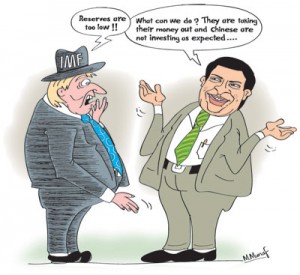Columns
Why Lanka is in balance of payments crisis again
View(s):The IMF mission’s latest assessment, released early this week, said, “The current account (of the balance of payments) remained stable, but the financial account weakened with the resumption of capital outflows” and the country’s “net international reserves fell short of the target.” In short the country is in a balance of payments crisis with low foreign exchange reserves.
 Fundamental reasons
Fundamental reasons
The question uppermost in the minds of many must be: Why are we in a balance of payments crisis again? The answer lies in the fundamental weaknesses in the trade balance, capital outflows, the non-realisation of expected inflows of Chinese capital and inadequate foreign investment. An early resolution of these by sound economic and financial policies is imperative to resolve the current crisis and ensure stability in the country’s external finances.
Trade deficit
The primary reason for the low foreign exchange reserves is the fundamental flaws in the country’s trade balance. Due to exports being only a little above one half of the country’s import expenditure, the large trade deficits of recent years have been an important reason for the country’s weak external finances.
The trade deficit of US$ 7.5 billion in 2013 expanded to US$ 8.3 billion in 2014 to US$ 8.4 billion in 2015 and to more than US$ 9 billion in 2016. Fortunately, the large trade deficit was entirely offset by remittances of about US$ 8 billion and tourist earnings of US$ 3.5 billion. However, the resulting surplus of about US$ 2.5 billion has been eaten away by outflows of capital that resulted in the external reserves falling from US$ 4 .5 billion in 2016 to US$ 3.5 billion at the end of January 2017.
 As the IMF stated, the current account remained stable, but the financial account weakened with the resumption of capital outflows. Had the trade deficit been contained at US$ 8 billion or less, the balance of payments crisis would have been averted.
As the IMF stated, the current account remained stable, but the financial account weakened with the resumption of capital outflows. Had the trade deficit been contained at US$ 8 billion or less, the balance of payments crisis would have been averted.
Capital outflows
The outflow of financial investments in the Treasury bond market, the non-realisation of expected inflows of capital to the Government and the inability to attract foreign investments weakened the foreign reserves. The outflow of financial investments in the Treasury Bond market was due to a lack of confidence in the country’s economic stability and uncertainty and lack of confidence in the Government’s economic policies. Admittedly, changes in international interest rates would have induced some of these outflows, but economic policies and statements, too, had a role in inducing the outflow.
Foreign investments
The inability of the country to attract foreign investments has also been due to the lack of coherence, consistency and certainty in government policies. The continuous public protests against government policies and their subsequent retraction or non-implementation have been significant causes for the erosion of investor confidence. Statements and actions of the Government have been deterrents and disincentives to investments.
Certain critical statements about large investors made them pull out their investments in the bond market. The Prime Minister’s intervention in the stock market to stop a large purchase of shares by a foreign investor from a state bank sent wrong signals to investors. An overhang of tax proposals that were not implemented were also unnecessary disincentives to investors.
Chinese investments
An unexpected setback to the balance of payments was the suspension of the expected inflows of capital from the Chinese investment in the Hambantota development projects. The Government expected the strengthening of the balance of payments and an enhancement of the foreign reserves early this year from the inflow of Chinese capital for the two Hambantota projects. These have not been realised owing to violent protests by the Joint Opposition’s campaign.
China has taken the position that the Government must resolve the domestic problem before it makes its investments. The non-realisation of expected funds of more than US$ 2.5 billion for the two projects has crippled the external finances. When will the Government be able to begin these projects?
Resolution of crisis
The fundamental weaknesses in the external finances of persistent large trade deficits are a serious concern that must be addressed in the long –term interest of the country. Further reduction of aggregate demand through monetary and fiscal policies may be needed to contain imports. Increasing exports is the long-term strategy to reduce the trade deficit.
The chaotic political environment, policy uncertainty and inept implementation are underlying causes for the balance of payments crisis. A consensus on economic policies followed by a clear statement is a prerequisite to inspire confidence among foreign and local investors. There must also be certainty that these policies are implemented without changes and retractions.
The political environment of opposition to nearly every policy of the Government, the protests and road demonstrations causing huge traffic problems, the opposition to Chinese investments are serious impediments to attracting foreign investment. One can hardly expect foreign investors to invest in such a chaotic country when far more hospitable locations are available.
While international interest rate changes may have been an important reason for investors to move out of the Sri Lankan Treasury Bond investments, the domestic performance of the economy and uncertain policy environment, too, contributed to the capital outflows. The prospects of a drought that would increase food and oil imports would only aggravate the trade balance and lead to further balance of payments pressures.
The IMF is scheduled to advance the third tranche of US$ 119.9 million in April. It is not likely that the Fund would delay this as all the conditions except the net international reserves position have been met. Perhaps the Government would also take some meaningful reform measures that have not been adequately addressed to ensure the third tranche.


Leave a Reply
Post Comment